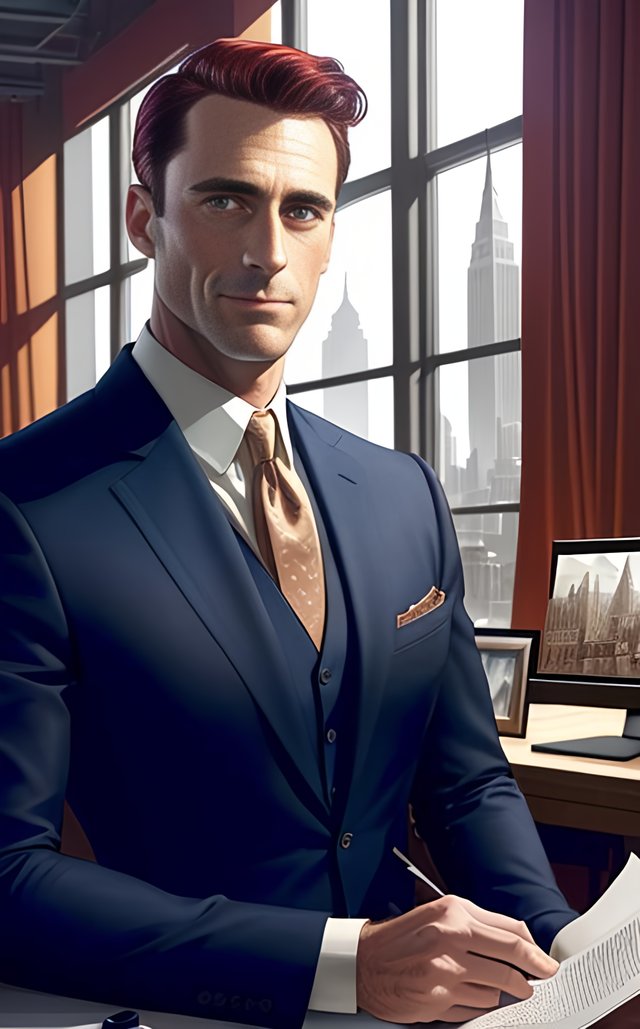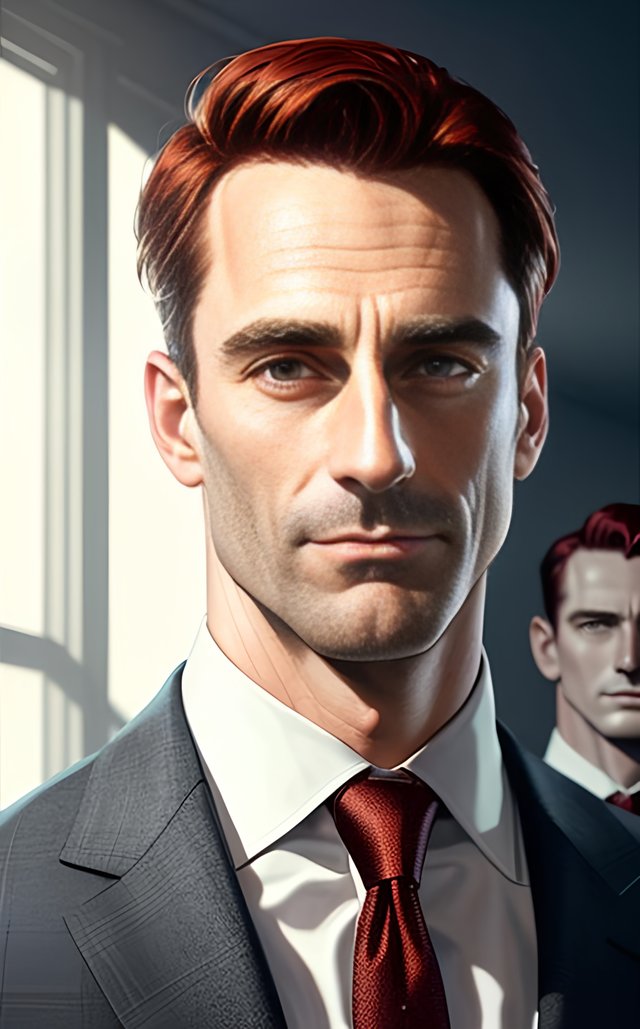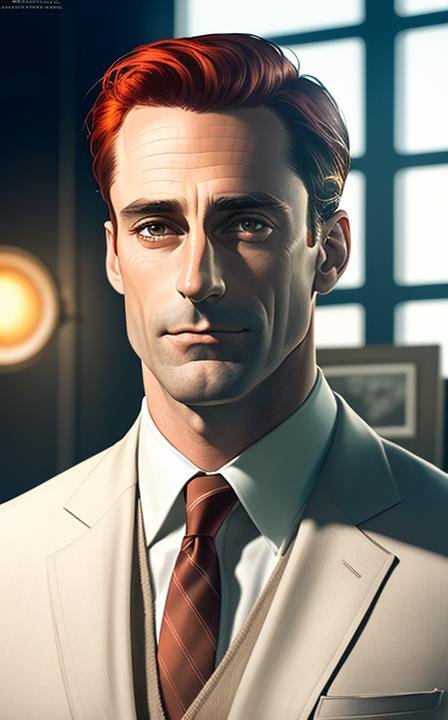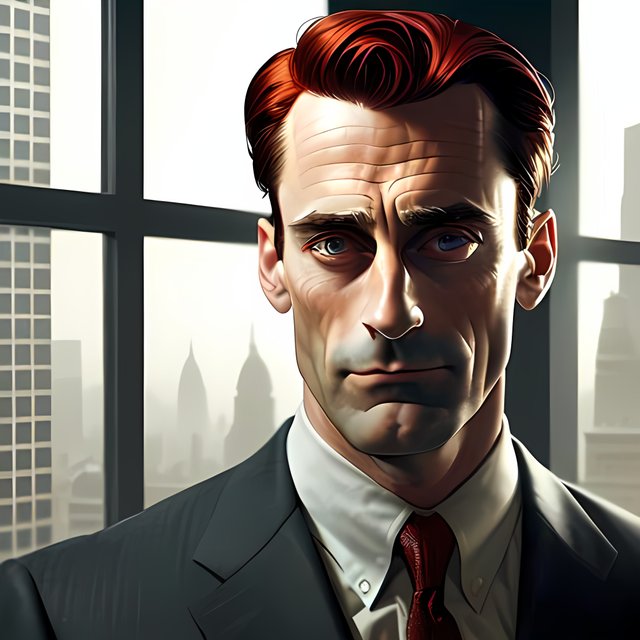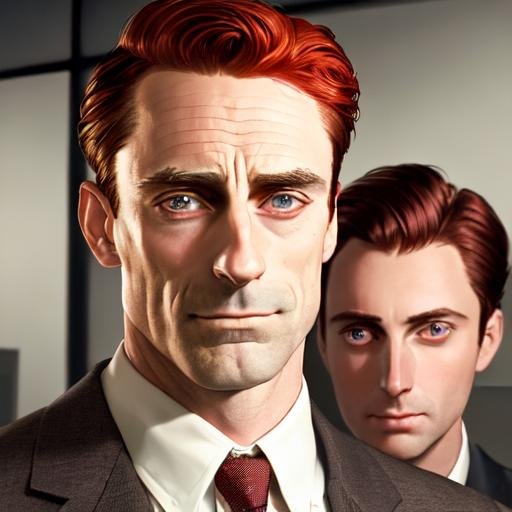# Navigating Ethical Dilemmas: Howard Roark's Moral Decision-Making in the Face of Adversity
Introduction to Howard Roark as the protagonist of Ayn Rand's novel, "The Fountainhead."
In Ayn Rand's iconic novel, "The Fountainhead," Howard Roark emerges as the central figure whose character and actions drive the narrative. Roark is a brilliant and uncompromising architect, dedicated to his craft and unwavering in his commitment to his own artistic vision. From the outset, it becomes clear that Roark is not an ordinary protagonist. He defies societal norms and rejects the conventional expectations placed upon him, standing firmly against the prevailing tide of conformity.
Roark's distinctiveness lies in his relentless pursuit of his architectural ideals, which stem from his core principles of individualism and integrity. He possesses an unyielding belief in the importance of personal freedom, originality, and self-expression, refusing to compromise his artistic vision for the sake of recognition or financial success. Roark's unwavering dedication to his principles sets him apart and makes him a captivating character to follow throughout the novel.
As readers delve into Roark's story, they witness the challenges he faces as a result of his staunch individualism. The architectural establishment, society, and even those closest to him often misunderstand and oppose his revolutionary designs. Roark's commitment to his values puts him at odds with the world around him, leading to conflicts and adversity that test his resolve.
Despite the trials and tribulations he encounters, Roark remains resolute, refusing to compromise his artistic integrity. His unwavering determination and unapologetic authenticity make him a hero in the eyes of those who appreciate his unwavering pursuit of truth and excellence. Roark's journey serves as an inspiration and a catalyst for readers to reflect on their own values and the importance of staying true to them, no matter how difficult the path may be.
In the pages of "The Fountainhead," Howard Roark's character resonates as a symbol of moral courage and the triumph of individualism. His unique perspective challenges conventional wisdom, reminding us of the significance of unwavering commitment to one's values, even in the face of adversity. Through Roark's story, readers are invited to explore their own ethical dilemmas and consider the transformative power of adhering to one's principles, ultimately leading to personal fulfillment and a profound sense of purpose.
Ethical dilemmas are pivotal moments in our lives when we are confronted with difficult choices that challenge our moral compass. These dilemmas arise when we encounter conflicting values, competing interests, or external pressures that put our principles to the test. The significance of ethical dilemmas lies in the profound impact they have on our character, integrity, and sense of self.
In "The Fountainhead," Howard Roark encounters a series of ethical dilemmas that test his unwavering commitment to his values. These dilemmas often revolve around compromising his architectural vision or conforming to societal expectations. Roark's refusal to sacrifice his principles in the face of these challenges highlights the immense importance of ethical decision-making.
Ethical dilemmas present individuals with complex choices, often requiring deep introspection and careful consideration. They force us to evaluate the consequences of our actions, the alignment of our decisions with our core beliefs, and the potential impact on our relationships and goals. The challenges they pose demand a level of moral courage and strength of character to navigate through uncertain terrain.
These dilemmas can be emotionally and psychologically taxing, as individuals grapple with conflicting desires, societal pressures, and the fear of potential repercussions. They call into question our values, forcing us to confront our deepest convictions and confront the possibility of standing alone against the prevailing tide. The weight of these decisions can be burdensome, leading individuals to question their identity, purpose, and the principles upon which they have built their lives.
However, ethical dilemmas also present opportunities for personal growth and self-discovery. They provide a platform for individuals to define and reaffirm their values, and to test the strength of their convictions. By facing these challenges head-on, individuals have the chance to strengthen their moral compass, enhance their resilience, and develop a greater understanding of themselves and their place in the world.
The significance of ethical dilemmas lies in the transformative power they possess. They provide individuals with the opportunity to forge their character and demonstrate their commitment to their values. Like Howard Roark, individuals who navigate these dilemmas with integrity and unwavering resolve have the potential to inspire others and leave a lasting impact on society.
Ultimately, ethical dilemmas serve as crucibles of moral decision-making, shaping individuals and defining their path in life. They remind us of the importance of staying true to our values, even when faced with adversity. Through introspection, courage, and a commitment to personal integrity, individuals can emerge stronger and more authentic, finding solace and fulfillment in knowing they have chosen the right path, regardless of the challenges it presents.
In this blog post, we will closely examine Howard Roark's moral decision-making process in "The Fountainhead." We will explore the influential factors, the challenges he faces, and the guiding principles that shape his unwavering commitment to his values.
By analyzing specific ethical dilemmas, we will highlight the complexities Roark encounters and the competing values at play. We will delve into his reliance on reason and personal conviction, emphasizing his refusal to compromise his principles.
Through Roark's moral courage, we will explore the risks he takes and the profound impact of his choices. The post will reflect on the broader implications for readers, encouraging introspection and drawing inspiration from Roark's unwavering commitment.
By understanding Roark's moral decision-making process, readers will gain insights into their own dilemmas and find strength and purpose in upholding personal integrity. Roark's story exemplifies the transformative power of moral choices in achieving fulfillment and inspiring others.
Roark's Unyielding Integrity
Roark's character is defined by his unyielding integrity, demonstrated through various encounters in "The Fountainhead." One example is when the Dean in the College of Architecture expels Roark for his refusal to conform to traditional architectural styles. Despite the potential consequences to his education and future career, Roark remains steadfast in his commitment to his architectural vision.
Another notable example is Roark's collaboration with Henry Cameron, an aging architect who has fallen out of favor with the public. Despite the challenges and societal criticism they face, Roark remains loyal to Cameron and his artistic principles. He continues to work alongside him, valuing the mentorship and artistic wisdom Cameron imparts.
Roark's integrity is further tested when he becomes the target of media smear campaigns. As his reputation is attacked and his work is criticized, Roark refuses to compromise his values or engage in public defenses. Instead, he relies on the strength of his character and the quality of his work to speak for itself.
Through these examples, Roark exemplifies the heroism and resilience that comes from maintaining one's values in the face of adversity. His unwavering commitment to his principles sets him apart from others, reinforcing the importance of staying true to one's beliefs despite the challenges encountered along the way.
Roark's journey in "The Fountainhead" exemplifies his refusal to compromise his architectural vision, even in the face of orchestrated challenges and smear campaigns. One significant example is when Ellsworth Toohey manipulates Peter Keating to convince Roark to take on the prestigious Cortlandt project. Recognizing Roark's greatness, Toohey aims to control and undermine him.
Despite the initial coercion, Roark completes the project with unwavering dedication, creating a magnificent testament to his architectural prowess—the Temple of the Human Spirit. However, the subsequent smear campaign orchestrated by Toohey attempts to tarnish Roark's reputation and destroy his career. Roark faces ridicule, damages, and a severe degradation of his standing as an architect.
Yet, through it all, Roark's unyielding spirit prevails. He refuses to be crushed by the envy and malice of others. Roark's resilience shines as he embraces the consequences of his greatness, knowing that the pursuit of his architectural vision and the expression of his values are worth the sacrifices.
The trials and setbacks faced by Roark serve as a testament to the unfortunate reality that envy and evil often target the great and the good. Ayn Rand highlights the inherent struggle faced by individuals who possess greatness, emphasizing that their extraordinary abilities and unwavering commitment to their principles make them targets for those who cannot comprehend or match their achievements.
Despite the orchestrated challenges, Roark emerges from the adversity as a true hero. He remains steadfast in his commitment to his architectural vision, refusing to compromise or be swayed by the efforts of the envious and malicious. Roark's resilience and ultimate triumph demonstrate that true greatness can withstand the onslaught of those who seek to tear it down.
Roark's journey serves as an inspiration to readers, reminding them of the importance of staying true to their values, even in the face of orchestrated adversity. By embodying unwavering determination and resilience, Roark shows that setbacks and attacks cannot diminish the impact of true greatness. In the end, Roark's architectural achievements speak for themselves, and his indomitable spirit prevails, solidifying his status as a revered and influential architect.
Ethical Dilemmas Faced by Roark
Throughout "The Fountainhead," Howard Roark encounters various ethical dilemmas that test his principles and challenge his unwavering commitment to his values. These dilemmas highlight the complexities of Roark's character and the choices he must make.
One notable ethical dilemma arises when Roark is approached by Hopton Stoddard to design the Stoddard Temple. Roark initially considers the project, bending his principles in response to Stoddard's persuasive arguments. However, Roark ultimately realizes that Stoddard is not a man compatible with the ideals he portrays. Recognizing that taking Stoddard on as a client would compromise his own integrity, Roark refuses the commission, despite the potential professional benefits.
Another dilemma emerges when Roark assists Peter Keating in constructing the Cortlandt project. Roark's decision to help Keating, despite his knowledge that Keating does not deserve the assistance, goes against his values. By enabling Keating's parasitic behavior, Roark compromises his own integrity. This dilemma serves as a stark contrast to Roark's actions when he assists sculptor Steven Mallory, a man whom Roark values for his talent and integrity.
In the face of a smear campaign orchestrated by Ellsworth Toohey and the betrayal of Gail Wynand, Roark confronts a significant ethical dilemma. Despite the overwhelming adversity and public condemnation, Roark remains steadfast in his innocence and refuses to compromise his integrity. He endures the orchestrated attacks, perseveres through the media campaign, and ultimately triumphs by proving his innocence and demonstrating the strength of his character.
In the aftermath of these ethical dilemmas, Roark's triumphs are evident. He constructs the reconstruction of Cortlandt, a testament to his architectural vision, and builds the Wyatt building, a symbol of his creative genius and perseverance. These triumphs represent the culmination of Roark's unwavering commitment to his values and his ability to overcome the ethical dilemmas he faced.
Roark's journey illustrates the complex moral choices individuals must confront and the profound impact these choices have on their lives. His ability to navigate these ethical dilemmas with integrity and come out on top demonstrates the rewards that come from staying true to one's principles, even in the face of immense challenges and temptations.
The Complexities and Competing Values in Roark's Dilemmas
The ethical dilemmas faced by Howard Roark in "The Fountainhead" are characterized by the complexities and competing values inherent in each situation. These dilemmas force Roark to navigate the intricate web of principles, personal desires, and external pressures.
In the case of the Stoddard Temple project, Roark confronts the challenge of reconciling his artistic vision with the expectations of his client, Hopton Stoddard. While the commission presents a significant opportunity for Roark's career, he recognizes that compromising his artistic integrity for the sake of pleasing a client would go against his fundamental values. Roark's commitment to his vision and refusal to dilute his architectural principles create a clash between his desire for professional success and his unwavering dedication to his artistic ideals.
The dilemma surrounding his assistance to Peter Keating in the construction of the Cortlandt project exposes the competing values of loyalty and self-preservation. Roark, despite his awareness of Keating's lack of talent and ethical integrity, temporarily compromises his principles to support a friend in need. However, this decision forces Roark to grapple with the conflict between his loyalty to Keating and the detriment it poses to his own values and self-worth.
Furthermore, Roark's battle against the orchestrated smear campaign orchestrated by Ellsworth Toohey and the betrayal of Gail Wynand reveals the clash between integrity and societal conformity. Roark's steadfastness in defending his innocence and refusing to succumb to the pressures of public opinion highlights the conflict between staying true to oneself and conforming to the expectations imposed by a society driven by envy, mediocrity, and collectivism.
These dilemmas illuminate the multifaceted nature of ethical decision-making and the complexities inherent in balancing personal values with external demands. Roark's unwavering commitment to his principles forces him to confront the contradictions and trade-offs between competing values. His choices emphasize the importance of staying true to one's convictions, even when faced with challenging circumstances that demand compromise or conformity.
Through these dilemmas, Ayn Rand portrays the internal struggle and moral complexities individuals encounter when confronted with choices that test their values. Roark's ability to navigate these complexities, consistently choosing his principles over short-term gains or societal approval, highlights the strength of character required to uphold one's values and pursue greatness despite the obstacles presented.
In the face of conflicting values, Roark's unwavering commitment to his architectural vision and personal integrity becomes a beacon of inspiration, urging readers to reflect on their own ethical dilemmas and the complexities involved in making principled decisions in a world that often demands compromise.
The choices made by Howard Roark in "The Fountainhead" carry profound moral implications and have far-reaching consequences, illustrating the transformative power of unwavering commitment to one's values.
Roark's refusal to compromise his architectural vision and principles reflects his unwavering dedication to his own artistic integrity. By rejecting commissions and projects that would compromise his values, Roark upholds the importance of individualism, creativity, and the pursuit of excellence. His moral stance challenges the prevailing societal norms that prioritize conformity and mediocrity.
However, these choices come with significant consequences. Roark faces isolation, ridicule, and professional setbacks as a result of his steadfastness. He endures financial hardships, public condemnation, and a smear campaign orchestrated by those threatened by his uniqueness and greatness. These consequences highlight the price one often has to pay for staying true to their values and defying the expectations of society.
In his assistance to Peter Keating, Roark's decision to help a friend in need despite knowing Keating's lack of talent raises moral questions. While Roark's intentions are rooted in loyalty and compassion, the consequences of his choice reveal the potential pitfalls of enabling others to parasitize off his talent and compromise his own principles. It serves as a cautionary tale, underscoring the importance of discernment and ensuring that one's actions align with their values.
Roark's battle against the smear campaign orchestrated by Ellsworth Toohey and the betrayal of Gail Wynand illuminates the moral implications of his refusal to surrender to external pressures. Despite the immense personal and professional challenges he faces, Roark remains steadfast in his innocence and resists compromising his integrity. This unwavering commitment to truth and justice showcases the moral courage required to withstand adversity and uphold one's principles, regardless of the potential consequences.
Through Roark's journey, Ayn Rand explores the moral implications of making principled choices in a world that often rewards conformity and mediocrity. Roark's triumph over adversity, his ability to rise above the consequences of his choices, and his eventual success in realizing his architectural vision serve as a testament to the transformative power of staying true to one's values.
In the larger context of the novel, Roark's moral choices exemplify the virtues of individualism, integrity, and the pursuit of one's passion. They demonstrate that while the path of upholding one's values may be arduous and fraught with challenges, it ultimately leads to personal fulfillment, authenticity, and the achievement of one's true potential.
Roark's story serves as an inspiration for readers to reflect on their own choices and the moral implications they entail. It encourages individuals to embrace the courage and resilience necessary to stay true to their values, even in the face of adversity and potential consequences.
Roark's Decision-Making Process
Roark's Approach to Ethical Decision-Making
Howard Roark's approach to ethical decision-making in "The Fountainhead" showcases his unwavering commitment to his principles and the moral compass that guides his actions. His approach can be characterized by several key elements:
Firstly, Roark places a high value on personal integrity and individualism. He firmly believes in the importance of staying true to oneself and pursuing one's own vision, even when it goes against societal expectations or popular opinion. Roark's commitment to his architectural vision is not driven by external validation or conformity but by his own deeply held values and convictions.
Secondly, Roark prioritizes rationality and reason in his decision-making process. He carefully evaluates the consequences and long-term implications of his choices, weighing them against his core values. Rather than succumbing to emotional or impulsive impulses, Roark exercises a rational assessment of the ethical dilemmas he faces, ensuring that his decisions align with his principles and lead to the realization of his vision.
Thirdly, Roark's approach to ethical decision-making involves a rejection of compromise. He refuses to dilute his artistic integrity or compromise his principles for the sake of personal gain or societal acceptance. Roark understands that compromising his values would diminish the essence of his work and dilute his sense of self. His refusal to compromise reflects his unwavering commitment to his own values, even in the face of significant challenges and opposition.
Furthermore, Roark's decision-making is driven by a profound sense of self-worth and confidence in his abilities. He recognizes the value of his unique creative vision and refuses to settle for anything less than the full expression of his architectural genius. Roark's unwavering self-belief empowers him to make ethical choices that align with his principles, even when they entail personal sacrifices or face severe consequences.
Ultimately, Roark's approach to ethical decision-making embodies the ideal of moral heroism. His unwavering commitment to his principles, rational assessment of the ethical dilemmas he faces, refusal to compromise, and strong sense of self-worth contribute to his ability to navigate the challenges and emerge as a symbol of moral fortitude.
Roark's approach invites readers to reflect on their own ethical decision-making processes and the importance of staying true to their principles in the face of adversity. It serves as a reminder of the transformative power that comes from aligning one's actions with deeply held values and pursuing greatness with unwavering commitment.
Howard Roark's choices in "The Fountainhead" are shaped by his unwavering commitment to his values and personal integrity.
Roark's values, including individualism and the pursuit of excellence, guide his decision-making process. He refuses to compromise his principles or conform to societal expectations, staying true to his authentic self.
Personal integrity is another influential factor. Roark's dedication to honesty and moral uprightness drives his choices. He acts in accordance with his conscience, refusing actions that compromise his integrity.
Furthermore, Roark's choices are driven by a strong belief in his self-worth and the value of his unique vision. He strives for self-actualization and resists settling for less than his full potential.
Roark's choices are independent of external pressures or societal expectations. He remains steadfast in his commitment to values and integrity, even in the face of adversity or short-term gains.
In summary, Roark's choices are influenced by his unwavering commitment to values, personal integrity, and belief in his self-worth. These factors guide him towards decisions that align with his true self and his pursuit of greatness.
Lessons in Moral Courage
Moral courage is a defining characteristic of Howard Roark in "The Fountainhead." It encompasses the willingness to uphold one's principles and values, even in the face of adversity or societal pressure. Roark exemplifies moral courage as he unwaveringly stays true to his vision and integrity, regardless of the challenges he encounters.
Roark faces numerous challenges and takes significant risks in upholding his principles. He encounters opposition from influential figures, endures smear campaigns aimed at discrediting him, and experiences isolation both socially and professionally. Despite these obstacles, Roark remains resolute, refusing to compromise his artistic vision or succumb to external pressures. His unwavering commitment exposes him to risks that many would shy away from.
Roark's moral courage holds immense significance beyond his personal journey. It serves as a powerful example for readers, inspiring them to reflect on their own values and the importance of standing up for what they believe in. Roark's unwavering dedication to his principles encourages readers to embrace moral courage in their own lives, even when faced with daunting challenges or societal expectations.
By embodying moral courage, Roark challenges readers to examine their own convictions and make choices that align with their principles. His character emphasizes the transformative power of staying true to one's values and serves as a catalyst for individual growth and societal progress. Roark's unwavering commitment to his principles showcases the preservation of individual freedom and the pursuit of greatness.
In conclusion, Roark's embodiment of moral courage in "The Fountainhead" imparts valuable lessons to readers. His unwavering commitment, the challenges he faces, and the risks he takes underscore the transformative power of moral courage in navigating ethical dilemmas. Roark's character serves as an inspiration, urging readers to embrace their own moral courage, uphold their principles, and make choices that align with their values in the face of adversity.
The Impact of Roark's Choices
Roark's moral decision-making in "The Fountainhead" yields both positive and negative consequences. By steadfastly adhering to his principles, he faces challenges and setbacks, such as professional isolation, smear campaigns, and legal repercussions. However, Roark's unwavering commitment to his values ultimately leads to personal triumph and professional success.
Despite the initial negative consequences, Roark's choices enable him to create architectural masterpieces that embody his vision and demonstrate his immense talent. His buildings, such as the Wynand Building and the Cortlandt Homes, become iconic symbols of innovation and artistic integrity. These achievements validate the positive outcomes of Roark's moral decision-making, highlighting the power of staying true to one's principles.
Roark's choices inspire and influence those around him, even in the face of opposition. His unwavering commitment to his values serves as a beacon of integrity, inspiring others to question societal norms and embrace their own individuality. Characters like Steven Mallory, a struggling sculptor, find solace and encouragement in Roark's unwavering dedication, enabling them to pursue their artistic passions with renewed vigor.
Furthermore, Roark's moral character challenges the conventional wisdom upheld by figures like Peter Keating and Ellsworth Toohey. His refusal to compromise serves as a wake-up call, forcing others to confront their own lack of authenticity and the detrimental effects of conformity. Roark's influence sparks a change in the mindset of those who witness his moral courage, inspiring them to reevaluate their choices and strive for greatness in their own lives.
Roark's moral character leaves a lasting impact on the readers of "The Fountainhead." His unwavering commitment to his principles serves as a timeless reminder of the importance of staying true to oneself and upholding personal integrity. Roark's legacy extends beyond the confines of the novel, resonating with individuals who are faced with their own ethical dilemmas and challenges.
Roark's enduring legacy lies in his embodiment of moral courage, individualism, and the pursuit of excellence. His character serves as a moral compass, inspiring readers to question societal norms, embrace their individuality, and stand up for their convictions. Roark's unwavering commitment to his values becomes a guiding light for those seeking to live a life of authenticity and purpose.
In conclusion, Roark's moral decision-making in "The Fountainhead" has profound consequences, both positive and negative. His choices inspire and influence others, challenging societal norms and encouraging individuality. Roark's enduring legacy lies in his unwavering commitment to his principles, serving as a beacon of moral courage and integrity. Through his character, readers are reminded of the transformative power of staying true to one's values and the enduring impact of moral decision-making.
Conclusion
Throughout this blog post, we have explored the moral journey of Howard Roark in Ayn Rand's novel, "The Fountainhead." We examined Roark's unwavering commitment to his principles, his refusal to compromise his vision, and the challenges he faced as a result. We delved into the complexities of his ethical decision-making process, highlighting the factors that influenced his choices and the moral implications of his actions.
Roark's story underscores the importance of ethical decision-making and staying true to one's values in the face of adversity. His unwavering commitment to his principles, despite the challenges he encountered, demonstrates the transformative power of moral courage. Roark's refusal to compromise not only led to personal triumph but also served as a catalyst for societal progress and the preservation of individual freedom.

It is our hope that readers draw inspiration from Roark's moral journey and apply it to their own lives. Roark's character serves as a reminder that staying true to one's values and making ethical decisions, even in the face of daunting challenges, is not only heroic but also essential for personal fulfillment and the pursuit of excellence. By embracing moral courage and integrity, readers can navigate their own ethical dilemmas with clarity and contribute to a world that upholds individualism and authenticity.
In conclusion, Roark's moral journey in "The Fountainhead" teaches us valuable lessons about the power of ethical decision-making and staying true to our values. His unwavering commitment, the challenges he faces, and the impact of his choices inspire us to reflect on our own lives and make choices that align with our principles. Roark's character encourages us to embrace moral courage, pursue greatness, and create a world that celebrates individuality and integrity.
Thank you for taking the time to read this blog post on Howard Roark's moral journey in "The Fountainhead." We hope it has sparked your interest and provided valuable insights into the importance of ethical decision-making and staying true to one's values.
We would love to hear your thoughts on Roark's character and the challenges he faced. Do you resonate with his unwavering commitment to his principles? Have you encountered similar ethical dilemmas in your own life? Share your experiences, questions, or reflections in the comments section below.
If you enjoyed this discussion and would like to explore more thought-provoking topics on moral courage, personal integrity, and the pursuit of greatness, please follow The Warrior Philosopher. We're committed to delivering inspiring content that ignites intellectual curiosity and encourages meaningful conversations.
Thank you again for your support, and we look forward to connecting with you soon!
The Warrior Philosopher

